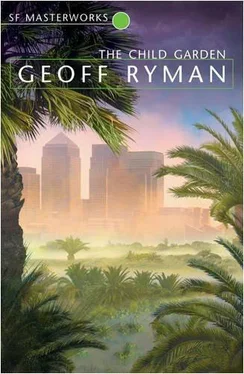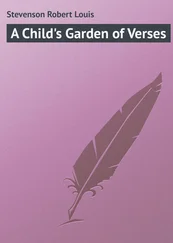‘You were obviously a very, very nice person who was not physically attracted to me, or to men in general.’ His expression really was rather tender. ‘I like cuddles.’
Milena could feel herself blushing furiously. She felt that she had been caught out in some way. She discovered that both hands were on her cheeks, feeling how plump and hot they had become.
‘I hope I didn’t mislead you,’ said Mike Stone. ‘I tried very hard not to play the tooch knave,’ he said.
The very idea of Mike Stone playing tooch knave restored some of Milena’s humour. Playing tooch? On what, Mike, the violin? ‘Mike. I never thought you were a knave.’ Her hands were lowered from her face. ‘Did I mislead you?’ she asked.
‘Not for a moment,’ he said, obviously thinking that this would reassure her.
‘I’m scared,’ she said. It was an explanation. She surprised herself by saying so.
‘Of what?’ he asked.
‘These days? Of the dark. I’m scared of the dark, since Thrawn. Isn’t that funny? Thrawn used light. I should love the dark. And I’m scared of… of the viruses and what they’re doing… and of… of you.’
‘That’s understandable, I am pretty weird,’ said Mike Stone. He meant it. ‘I can’t say for sure if I’m scared of anything at all.’ He meant that, too. He shook his head. ‘I can’t think of anything that scares me. There are just some things that I can do and some things that I can’t. I’m always amazed by the things you can do. You seem to get people to do things just by talking about what’s got to be done. You seem to be able to talk to pretty near anybody. That’s because you’re frightened. I think you can do all that because of the fear. I do the best I can without it.’
‘You’re not, are you? Frightened?’ She saw what he meant. She had thought it was fear that made him stiff and awkward. She was beginning to see now that it was instead a quality of precision, like a watch, exact and unselfconscious.
‘Only because I don’t feel there’s anything to lose. If I can’t do something, like talk to people, there’s no shame. I tried. I did my best. If I can do something, there’s no shame. I did my best.’
I’m going to like you, thought Milena. I’m going to like you more and more. I don’t think this was a mistake, after all.
‘I’d like to go to bed,’ he said. ‘I’d like to hold you. You always look cold these days. I’m very hot. I have very hot feet.’
‘I knew someone else who had very hot feet,’ said Milena. It had been so long since anyone had held her. She looked up at him. In fear.
We could of course spend time cooking a meal that neither of us wants to eat. He could get out his violin, and I could comment on his playing. But the tension would remain. There would still be this to face. To do anything else would be an evasion, a dishonesty. And so this must be faced, even in fear, and I do feel fear. Prissy, obsessive, severe, that’s what Cilia said. Am I still those things? I don’t like this. It makes me feel estranged from myself, as if I have to give myself up. It makes me feel alone and exposed, an orphan.
Mike Stone let Milena lay on the bed in most of her clothes, and then went to the bathroom to wash, knowing instinctively that she would not like the smell of men. He came back, naked and neutral, and his body was more bizarre than she had imagined. In the midst of her fear, she saw that his body made her smile.
He was stretched upwards, very tall and thin, like something by Goya, with narrow sloping shoulders, and a washboard tummy, and arms and legs that were all knots and angles. His hips were very broad, almost feminine, with broad spaces between the thin legs. He was hairless except in unexpected places, on the shoulders, or in a ring around his nipples. His nipples were so pale and small as to be invisible.
Mike Stone had a huge and useless dong. It flapped back and forth between his thighs, smelling of soap, like some hapless passenger on a bumpy train ride, and his testicles hung by such a slender thread of scrotum that Milena found she had sympathy pains in places she didn’t have. She was curious to see male genitalia, out of the mildest and most objective sort of interest. He settled next to her in the bed, and she wondered what she could do. She thought of stretching out her hand to touch him, to touch his penis. Something made of iron stopped her, as if a virus. She could never do that. She felt a stirring of distrust. What if he had lied, what if he would now come to life, and force her? Instead he put his arm under her head, and cradled her up, and lay her face on his chest, settling with a sigh.
Milena felt human flesh again, warm, against hers.
She was surprised by the body. She had thought that men would feel knotted and muscled and hard, all bone and sinew. His wiry flesh was still soft and smooth, warm and sheltering. She shivered in his grasp, still afraid. Experimentally, she put a trembling hand on his chest. He turned his face and looked into her eyes, with the preternatural trust, the animal simplicity, the brown eyes of a child. She smiled back, and found the fear began to melt.
He made a grunt of satisfaction. They lay still and quiet as dark descended. Milena had found a harbour, a place of refuge that was warm in the unseasonable chill.
During the Summer of Song, the summer of drought, each day began high and early with silver light filling an empty sky that looked like the inside of a bell. The floors would still be warm underfoot from the day before. There was no water to wash with; the water Milena drank was still hot in its wooden bucket from the previous day. Everything stank of rotting reed, and there were no more flowers at funerals: the flowers had all died.
By the middle of September, it had not rained for four months. The upper reaches of the Estuary were dry. Milena had to walk across the Slump to the main channel of the Thames, which was still navigable. In all that dreadful summer, those early walks were the thing she hated most.
The algae and the water plants had dried into something like papier mache, a tough, leathery coating over the mud, over the stones. When it burst underfoot, dust and a dank smell like crypts escaped. There were a few shallow farming ponds left.
Milena remembered approaching a pond, and the ground ahead seethed. Hundreds of frogs lolloped into the brackish water. Overhead, marauding herons circled. It was seven o’clock and already the heat was like a hammer. Already Milena was drenched in sweat, her lips were cracked and her throat dry. Children sat, disconsolate on the banks, feeding on sunlight, no longer bothering to chase the herons away.
‘Good morning!’ Milena called to them, trying to be normal.
The children looked at her in fear and silence. They sat up and edged away.
Milena rocked as she walked, moving her head up and down, left and right. She was escaping the disruption in her eyes. When she looked in the mirror she saw someone with the eyes of a lizard, closed over with a metallic, gleaming surface. The eyes are the doorway into the soul; her mirror lenses denied all sorts of exchange besides exchange of light. People would look away from her, repelled. She saw the world, with its bright sun glaring on white stones and bleached plants through a dim blue filtering.
In the blazing heat, Milena wore gloves. She wore a heavy shirt that buttoned down around her wrists, she wore thick trousers and a scarf around her face. If any of her skin was exposed to light, the torment would begin. Light would concentrate just under its surface until it burned. There were blisters around her eyes.
Milena walked past the children into the dead rice paddies, where she would be alone. She walked with dread. Whenever she was alone, the images began.
Читать дальше












